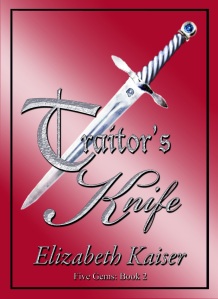
Available on Amazon Today
Sometimes the best way to change the world is by writing your own.
I’m here with Elizabeth Kaiser, author of the new YA fantasy book Traitor’s Knife – a sequel to 2011’s Jeweler’s Apprentice – to talk about writing and her latest story.
From an off-grid childhood to digital publishing, Elizabeth has taken the quantum leap into the tech age. She lives with family & farm animals in the Midwest, but her online home is EKaiserWrites.webs.com and E.Kaiser Writes-A-Blog where she respectfully does not flood anybody’s inbox.
In her first book in the Five Gems series, Jeweler’s Apprentice, a bookish heroine, Fia, stumbles onto a court secret while trying to save the princess (who turns out to be in no danger at all). To get her out of the way, Fia is sent on an apprenticeship to a high mountain jeweler. Meanwhile, a civil war in the neighboring kingdom is spilling over into the jeweler’s house.
The sequel, Traitor’s Knife, continues Fia’s adventures as she encounters refugee children, a disturbingly upstart former messenger, saboteurs and accidents happening everywhere.
JLaren: What inspired you to start the Five Gems series?
Elizabeth: I started the story line as a gift for my youngest sister, Abigail. She was turning 16, and always a big supporter of my writing, and I wanted to do something special for her. But she hates all the “sweet 16” cliches (as well as most others), so I set myself the challenge to write a cliche-free story about a girl who was 16. I think I mostly succeeded, and she loved the novel. She loved it so much, she insisted there be more to it, and so we came up with more… a lot more! We now have a projected 5 book series, and Traitor’s Knife, this summer’s release, is the second book.
I think you’ve found something original with jewelry making as a main theme. What made you choose it?
I chose jewelry making as a main activity because it was something that was uncommon in fiction in general, and something I know quite a bit about. My other options of Horses, Farm, Shepherdess, Herbs, were all sooo overdone, they’ve nearly become cliches. So they were out! And gems have always fascinated me. They were easy to write about, and Abi’s a sucker for a good stone of almost any color so I knew she’d fall for it. I think we all do! There’s something eternally mysterious about gemstones; they’re just so gorgeous. And most of them are pretty useless as far as actual uses, but their allure has held fast in our hearts and minds for centuries and centuries. (I love finding photos of ancient jewelry, even more today than I did as a girl!)
That’s quite a gift! I bet Abigail really enjoyed it. You mentioned you had a lot of material written. This might be jumping the gun, but have you written parts of the next 3 books after Traitor’s Knife? Is there a master plan for the series?
There is definitely a master plan! Now that Abigail is on board for the plotting… well, let’s just say things got detailed fast! So detailed I can’t remember it all, and I’m glad that she has a mind like a dicta-bird on these subjects! Yes, there are parts written of future books, and a whole lot more that isn’t! We’re pretty excited with the way Traitor’s Knife really upped the tension of the tale in Jeweler’s Apprentice, and we think readers will love what happens as the series spirals up. Our heroine, Fia, continues to grow and master herself as well as her craft, and each successive novel sees her stepping up her game to a new level each time. What started as a coming-of-age story for a girl who loved jewelry making has gotten involved with the face of wars and the repercussions all around. Of course, this is set in a non-industrial world, so wars are hand to hand, but still devastating to those directly involved.

Elizabeth Kaiser
Even though the book is set in a non-industrial world, are Fia’s experiences based on someone you know, or events in your own life?
I would say that her everyday experiences are very much things I’ve experienced, with small twists here or there. But I grew up in a barely-industrial world, so to speak. A good chunk of my childhood was without electricity, so candles, hauling water by hand, doing chores by lantern light; those are all things I’ve done myself. And yes, it makes a huge difference when writing about that sort of thing. The war/tension… a lot of that comes from my voracious reading habit during those electricity-less, TV-less years, and so I feel I’ve done a pretty good job of writing about those things realistically. Beyond the “plain facts,” everything an author writes has to come from someplace within them; so yes, those feelings, those fears, I think it speaks to all of us. Especially to my generation, I think we’ve definitely grown up in a much scarier world than our parents did, and I think that fact isn’t necessarily a bad thing. Life is scary, it’s out of control, and that’s good to recognize because only in that place do we truly we meet the One who has it all under wraps. So, yes, to a little bit of everything, I guess!
Which books from your “voracious reading habit” influenced your writing style most? Who’s your favorite author?
Oh, that’s a toughy. I guess my favorite author is easiest. Tolkien would be the answer, and the Hobbit is my favorite work of fiction. I love the language. He polished that book to perfection; in a way that LOTR didn’t have time for. I can pick it up and read any sentence and come away with a smile. It’s just that good. Like I said, I love the language, and one of the thrills of writing is being able to use words to paint pictures…and a great source of truly inspiring, hard hitting words is the KJV (King James Version of the Bible). That’s got a flow and a flavor to the words that can’t be replicated. So I do get a lot of inspiration there, but I make sure my writing doesn’t slide off the edge of words-for-words sake. Another place where the Bible is great at, succinctness. Very to the point in most places, and yet there’s so much for the imagination to fill in.
It’s hard to beat God and Tolkien for sources of inspiration. You paint some excellent word pictures in Jeweler’s Apprentice. Was there a particular scene or chapter of your latest work that was particularly enjoyable or challenging to write?
I guess the climactic scene, where they’re on a snowy mountain trail in the cold and all the action that builds up to and then explodes. That was a little intimidating as I faced it, but once I started it just all came pouring out scene by scene. When I had finished putting in everything that needed to be there, I stepped back and looked at it, and to my amazement it all flowed. There wasn’t really anything that needed to be tweaked… it just WAS. That was pretty neat. And I’ve received feedback from beta readers that they adore that climactic scene. So that always gives me the warm-fuzzies!
It sounds like the story just comes to you. That’s real talent. Do you have any advice for other aspiring writers?
Well, first off I’d say that writing can only mirror life, not replace it. So focus on real life above all, and if writing is in your blood, it’ll work out. Never be afraid to do something poorly before you can do it well, and always, Always, ALWAYS look out of the lessons in everything around you! There’s scads of them, and your most important tale should always be your life’s own. After all, you might be the only true story some people ever exposed to. Beyond that, read lots, study lots, and practice lots! And never think that “good enough” is something somewhere out there. Life is in the little things, so that is what we need to pay attention to.
Traitor’s Knife comes out today on Amazon.com.

